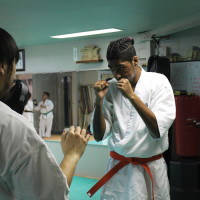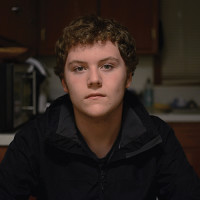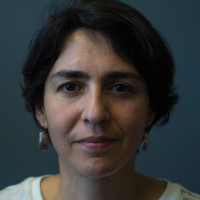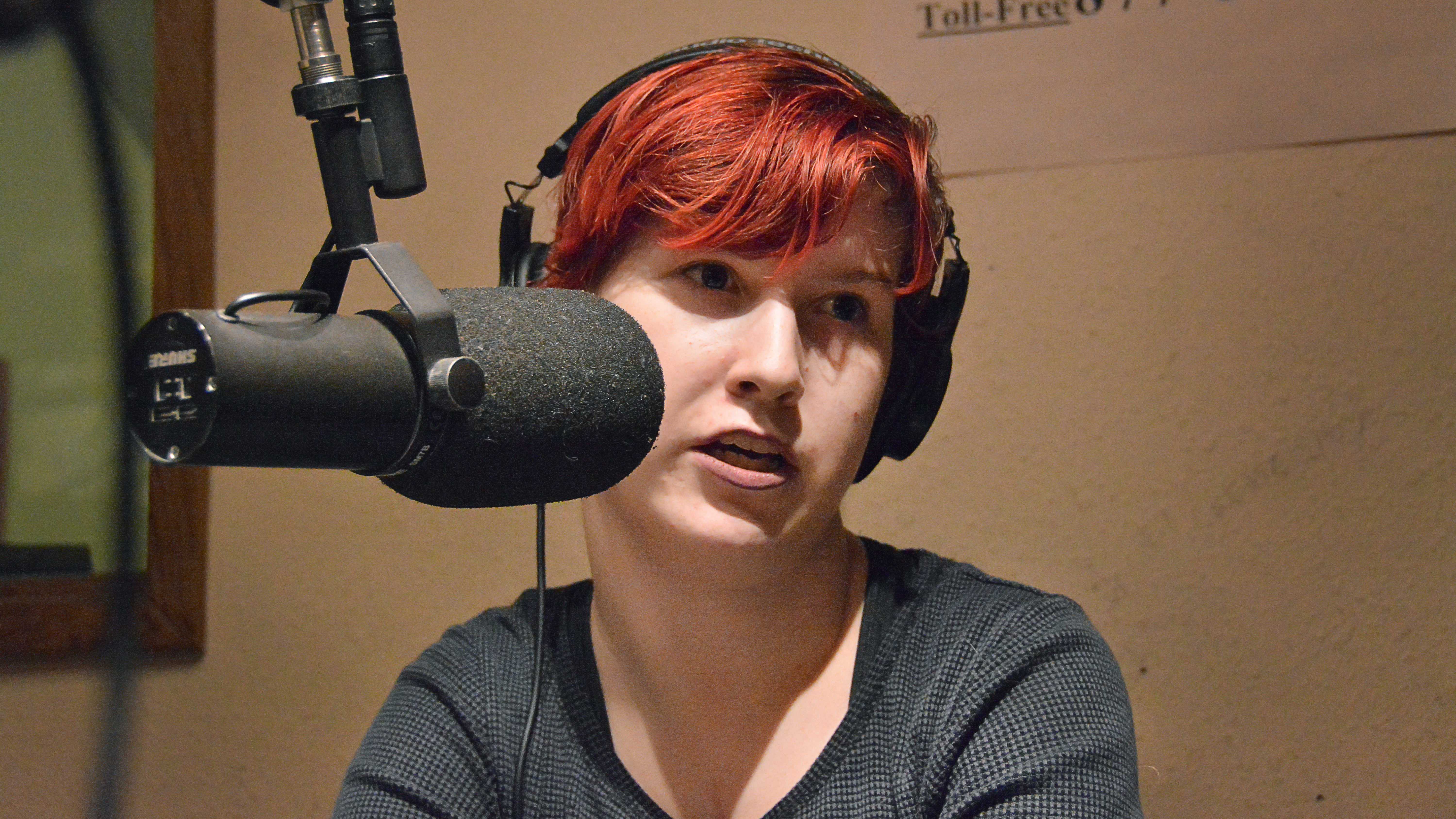
It is 6:25 p.m. on a recent Wednesday, and Grant High School junior Gene Sandall zigzags through the hallways at KBOO radio station in Southeast Portland. Wearing purple lipstick and a green leaf crown that sits atop his short red-dyed hair, Sandall catches up with his peers – a group of teenagers who make up KBOO’s youth collective, “The Underground.”
After meeting to go over each person’s agenda for the day, Sandall and three other members of the collective squeeze into a small room amongst stacks of CDs and records. Leaning in close to the recorder, they read lines from a radio play about ghost hunters and their dog.
The collective has been a sanctuary of sorts for the 16-year-old Sandall, a place where he feels safe to express himself and tell stories.
For Sandall, who was born with a severe heart condition, writing has long been a coping mechanism that opened doors of interest. From an early age, writing helped him through his depression, his struggle with gender identity and his eventual transition from female to male.
Sandall’s transition wasn’t easy. He was born anatomically female but has identified for some time as male. Since then, he has worked to find acceptance and embrace who he is today.

Growing up, he had a similar upbringing to most kids. His parents would read him stories all the time. “I would read anything that was around. I would read newspapers. I would read articles, even if it was above his understanding,” says his mother, Amy Sandall. “We read everything and … eventually Gene would read himself, and he would take it from there.”
Sandall was unable to get the storylines and characters out of his mind, and his imagination went wild. He began telling his parents his own stories and worked with his grandmother to publish a children’s book by the time he was 9.
Now Sandall has started using his writing to enter the world of radio production. “It makes me feel accepted,” says Sandall. “When I write in KBOO, I feel like a somebody who can do anything. I feel like I matter.”
In November 1999, Amy Sandall went in for an ultrasound five months into her pregnancy. During the procedure, Amy and her husband, Henry, found out their child had pulmonary atresia – a condition where the pulmonary valve of the heart doesn’t form correctly and creates a solid sheet of tissue in the lungs. The condition makes it so blood can’t pick up oxygen in its normal route to the heart.
“There wasn’t really anything we could do other than wait for the birth. We were about to go into birthing classes, and we didn’t get to do that because Gene came early,” says Amy Sandall. “We really walked into it pretty blind.”
On Dec. 16, 1999, Gene Sandall was born three months premature. Just minutes after the delivery, Sandall was taken to the Neonatal Intensive Care Unit at Randall Children’s Hospital until he was stable enough for doctors to operate, and they worked to restructure his heart.
Six months later, he would return for another surgery, and from there, visits to the hospital became a regular occasion. “It was good for me that at that time I had a job that I could be there with Amy for the surgeries,” says his father, Henry Sandall. “We were there together the whole time, every time.”
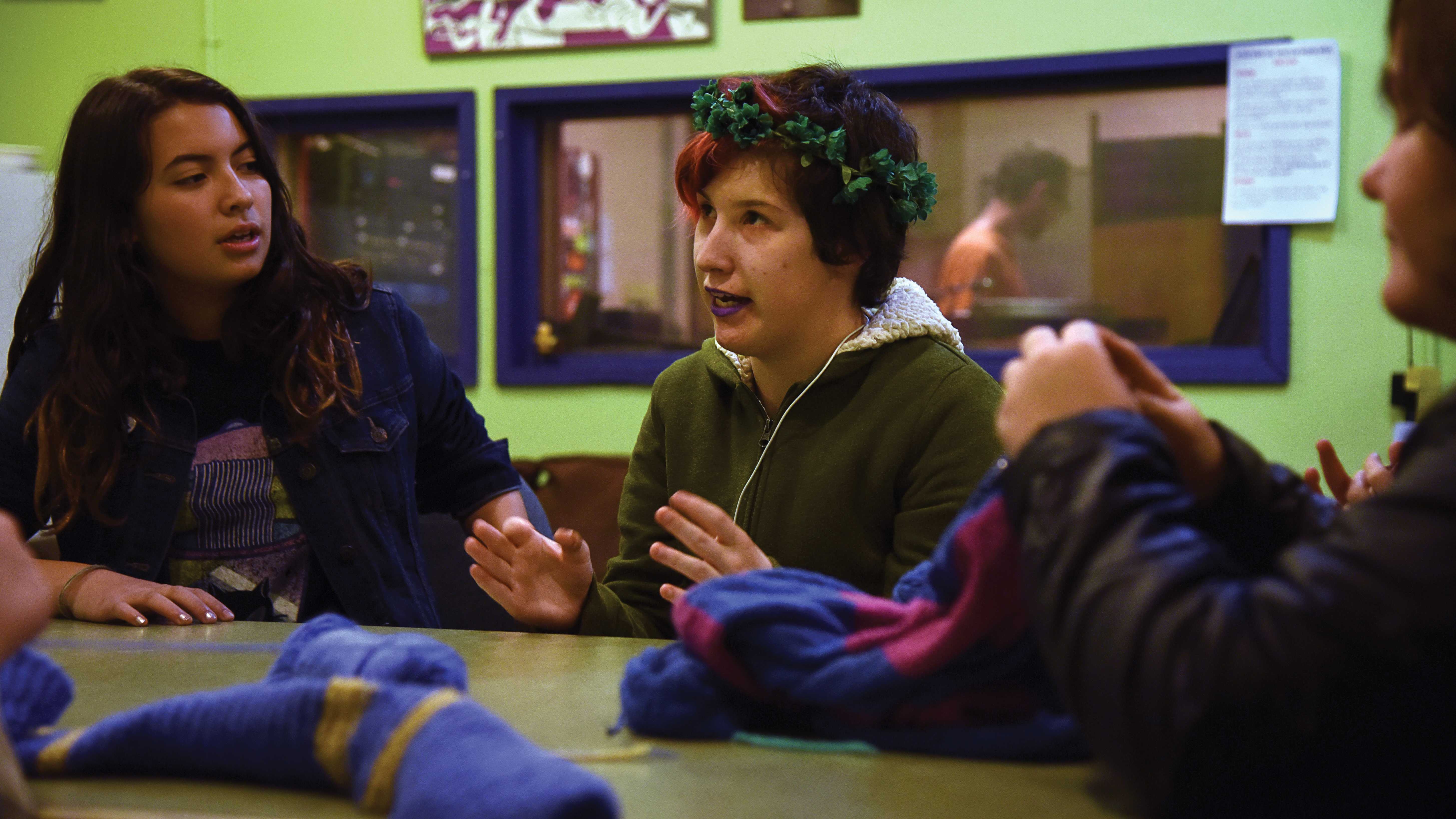
Growing up with his heart condition, Sandall wasn’t able to participate in sports or physical activity with the rest of his classmates, but he could write. From the age of 2, Sandall would come up with stories off the top of his head that ranged in topic from unicorns to orphans. His parents saw the novelty of his imagination, and they began to write the stories down.
Sandall’s grandmother, Ronda Sandall, played a big part in helping him with writing. She would tell him scary stories about the “hands in her attic” that would later be featured in Sandalls’ first published children’s book, “The Hands in Nana’s Attic” in 2009.
After the book was published by Tate Publishing, Sandall’s self-esteem went up. “My confidence was really boosted,” he says. “Normally, I was like the quiet kid who didn’t like to say anything.”
During elementary and middle school, socializing was tough. He tried to keep up with the other kids playing tag and being active, but his health issues restrained him. “I would feel isolated because … we would be running outside, and I would try to be running with them, and then I would just tire out and have to stop,” he recalls.
By seventh grade at Mt. Tabor Middle School, he found himself at a secluded table during lunch. It was there where he found a group of friends who had similar interests and experiences. “I had found other people who were outcasts as well,” says Sandall, who felt included for the first time in his life.
But it wasn’t enough. While family life was going along well, Sandall was still struggling and started showing signs of depression. He began harming himself and voicing suicidal thoughts. The tasks of everyday life became more challenging.
“Heart patients are typically depressed – it goes along with that,” says Amy Sandall. “I knew that, but I didn’t know what it was going to look like. It terrified me.”
Sandall used unhealthy habits to get through rough days. “I started doing what I do now where I would isolate and just listen to music constantly,” he says. “The only enjoyment I had was when I was home and writing.”
Later, he was diagnosed with clinical depression. After numerous conversations with his parents, Sandall agreed to see a therapist. The first idea was to try medication, but they quickly decided against it. “We didn’t just want to give all these drugs to a 12-year-old and see how that works,” recalls Henry Sandall.
The diagnosis was hard for his mother to wrap her head around, in addition to the other health issues that Sandall was already facing. “I felt angry, first and foremost. I was really scared because of the suicidal talk,” says Amy Sandall. “I would check on Gene obsessively.”
Gene Sandall remembers feeling down. “For me, it looked like isolation and a lot of feelings that I don’t understand a lot of the time,” he says. “I am full of energy in my body, but in my mind I don’t want to do anything.”
Through it all, he continued to write. He began writing fanfiction about characters from TV shows. “Gene was really into writing back then,” says his friend, Vanessa Vu. “He would collaborate with a bunch of people and try to write a bunch of stories at once.”
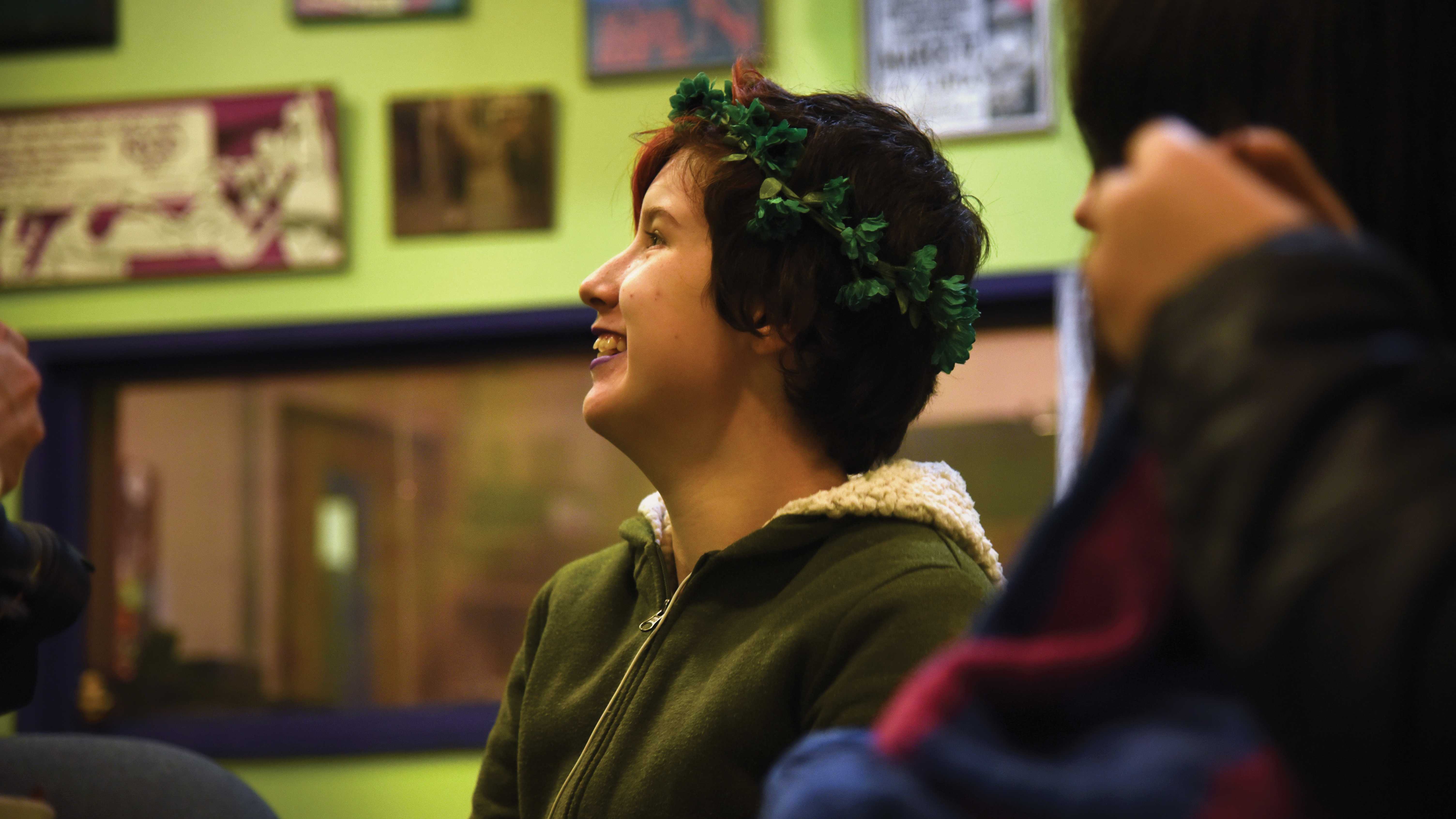
By his freshman year at Grant, Sandall found a new group of people who shared similar interests, and he began to move outside of his comfort zone. “I just expressed myself because my parents had always told me to express myself. I wore every single article of Dr. Who clothing, and people just noticed me,” says Sandall. “It was just easier for me to start a conversation – and that’s why I have the friends I have today.”
The new group of friends helped distract him from his depression, but only to a certain extent. The stresses of high school and relationships became difficult to handle, and in December 2014, Sandall attempted suicide before being hospitalized.
“It was hard to accept that was happening,” says Amy Sandall. “I think we started understanding what was happening and what was going on and that it was real, and that we couldn’t ignore it anymore.”
Back at school, Sandall began to meet with Grant’s school psychologist Rebecca Dorn, who helped him explore his issues and the transition to high school. She suggested dialectical behavioral therapy – a practice where parents and children learn skills that are helpful for tackling issues within the family.
Sandall, who early on identified as a girl, changed his pronouns and began identifying as male during his freshman year. This transition came about when he learned that he wasn’t alone in questioning his gender identity.
At first, Sandall chose to use gender neutral pronouns. “I know I feel masculine as well, so ‘they/them’ kind of fits,” he says. Sandall changed his first name to Gene, which was his middle name.
By December 2015, Sandall felt the need to come out to his parents. “They didn’t understand,” he says. “They thought it was just me being influenced by my friends, but it’s just something I feel inside.”
Throughout his freshman year, the Sandalls attended the therapy sessions suggested by the school psychologist every week, and it prompted them to have a family meeting to discuss the changes Gene Sandall was going through.
His parents say the therapy helped turn their lives around for the better. “It completely changed the way we think about stuff,” Amy Sandall recalls. “There is a way to discuss something without being in the heat of the argument.”
Henry Sandall says being able to calm down and take a step back helped take stress out of the situation and allowed him to remember what’s important. Later that summer, the Sandalls stopped going to therapy after Henry was laid off from his job because the family couldn’t afford it.
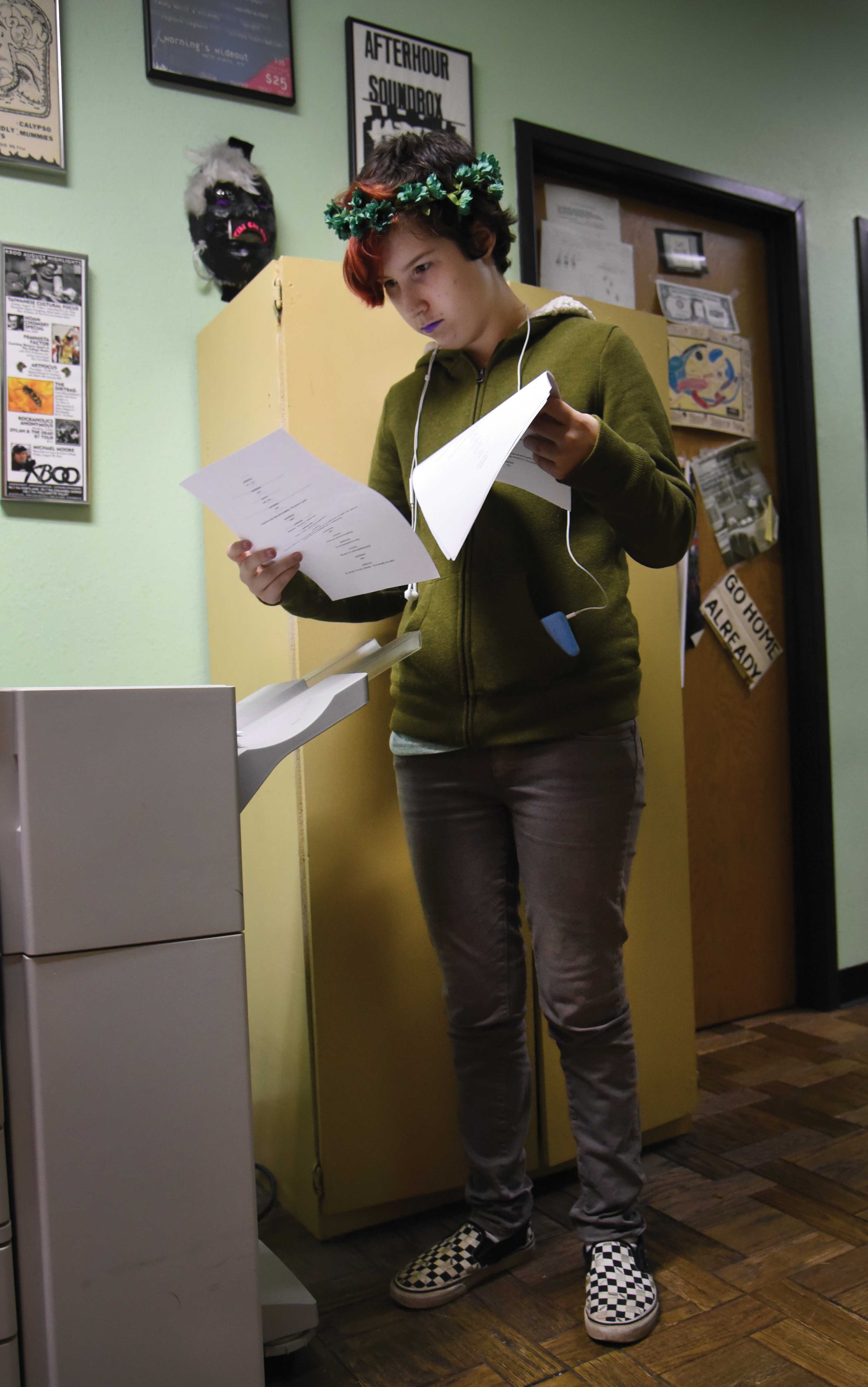
Shortly after, Henry Sandall heard a young girl on the radio helping with a fundraiser for the Youth Collective at KBOO – the radio’s monthly, hour-long segment run by teenagers about youth issues. The collective allows kids ages 9-18 to learn how to manage the recording studio and record pieces they write about youth issues. Henry Sandall thought it would be a great fit for his son.
Before Gene Sandall knew it, he was being dropped off at KBOO. There were people running around left and right, recording studios were full and live count downs were taking place all at once.
At first, it was overwhelming. “I was there by myself with all these other kids who I had no idea who they were,” says Sandall. “I was there on a radio day when they actually produced everything, so that was probably the best way I could have been introduced to it.”
Since Sandall’s first day in August 2015, he has produced many pieces, including poems about the ocean and the infamous shooting at an Orlando nightclub that left 49 people dead and 53 wounded.
“We are really trying with the people here, the ideas everyone has and just trying to really engage in progressive, special change,” says Erin Yankey, the program director at KBOO. “Remembering that we really can actually talk with each other without screaming at each other or insulting each other. We have really strong house rules.”
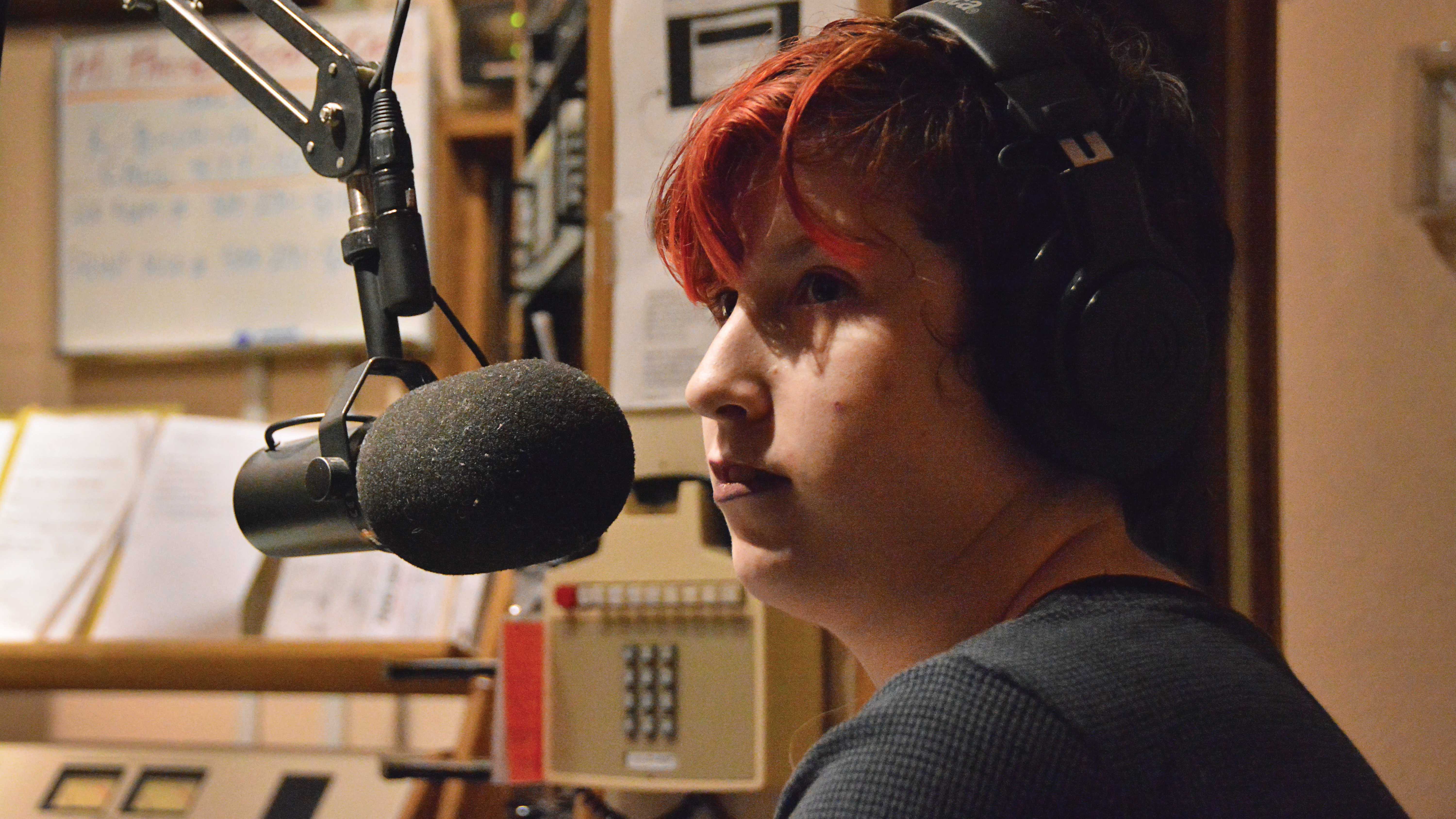
Sandall’s time at the radio station helped, but he continued to struggle with depression. In the winter of his sophomore year, Sandall attempted suicide for the second time. This was a wake-up call to his family about how deep his depression had reached.
“I was upset because we were doing all the things we were supposed to be doing. We had counseling. We started medication. It was like someone needs to do something because we’re back here again,” says Amy Sandall. “We just didn’t know what more we could do at this point.”
It took a while for the family to recover from the experience, but after a few months, they tried to move forward and communicate better. With Sandall going to weekly meetings at KBOO, he was able to cope with his feelings and distract himself from his depression.
KBOO became a place where each week Sandall could return as if nothing had really changed. It didn’t matter what he wore or how he identified. He was just a teenager who loved to write. “I always wanted and still do want people to read my writing,” he says. “I want them to feel something from what I write no matter what that may be.”
The environment and mindset at KBOO is such that people are aware of gender and sexual identity, making Sandall feel even more comfortable. KBOO is very diverse, Yankey says of the organization. “I have never been to a place that is as diverse in terms of people, politics and content,” she says. “It is just so different all the time.”
Sandall says it’s a place where he is not going to be judged for what he says or does. His parents still worry about his safety in a world that is not as accepting of all genders. “Violence is always under the surface. You love your kid so much, you want everyone to love them, too,” Amy Sandall says.
“They thought it was just me being influenced by my friends, but it’s just something I feel inside” – Gene Sandall
In January, Sandall took the step of fully identifying as male and changed his pronouns to “he/him,” with everyone except his family.
At home, Sandall was hesitant to tell his parents because he wanted to give them time to transition into using his preffered pronouns. But, after an incident with his parents where he didn’t feel comfortable wearing a dress to an occasion, he decided it was time to address the change of pronouns at home.
While his parents are open-minded about Sandall’s gender identity, it’s been difficult to adjust to different pronouns, they say. Sandall has been patient and forgiving through the whole process. Despite this, his parents see Sandall’s transition as a positive shift.
“It is like getting to know Gene,” says his mother. “Like everyday, you just leave your mind open to get to know who Gene is today and try and be respectful with that.”
For the past few months, life at home has been easier. “My parents are OK with it. They are transitioning through it,” says Sandall. “They bought me a new wardrobe and let me cut my hair short. It’s nice to be accepted.”
Sandall’s change over the last few years is reflected in his work. “I notice now in my writing that I wrote about lonely characters who were upset, characters who didn’t have friends but had super powers and were making friends through that, and finding their own world that they can escape to,” he says. “They are not lonely and sad anymore … they are growing into something else – just like me.”
Sandall continues to produce work at KBOO and is adding to over 30,000 pages of writing in his notebook and on his computer. He’s in the process of writing an action thriller called “Clinical Mobs.”
“Writing is my future; that’s just how it’s going to be,” says Sandall. “There is no timeline in any of the universes that we’ve ever had where I’m not a writer. I am feeling pretty good about life. I no longer feel like I did before. I feel solid where I am, and I am happy to be here.” ◆


